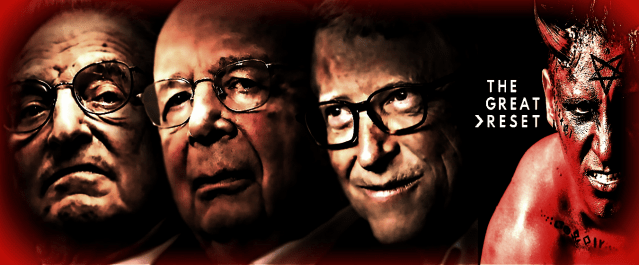The Unholy Trinity: Soros, Schwab, and Bill Gates – The Architects of our Dystopian Past, Present & Future
In recent years, the names George Soros, Klaus Schwab, and Bill Gates have become synonymous with influence and power. These individuals have made their mark in various domains, from finance and philanthropy to global governance and technological innovation.
However, their rise to prominence has not been without controversy and scrutiny. As their names continue to be intertwined with global events and initiatives, it is crucial to delve deeper into their backgrounds, connections, and the implications of their actions.
In this article, we explore the enigmatic personas of Soros, Schwab, and Gates, shedding light on their influences, examining their connections, and critically analyzing their impact on the world stage.
Prepare to uncover a web of power, controversy, and potential dystopian consequences that have already occurred and may arise from their actions.

Let’s not lose touch…Your Government and Big Tech are actively trying to censor the information reported by The Exposé to serve their own needs. Subscribe now to make sure you receive the latest uncensored news in your inbox…
George Soros: A Figure of Controversy
George Soros, a Hungarian-born billionaire investor and philanthropist, has garnered significant controversy and attention throughout his career. His financial success as a hedge fund manager, particularly during the 1992 Black Wednesday currency crisis, thrust him into the international spotlight.
Soros is known for his substantial political donations and support for liberal causes, which has drawn both admiration and criticism.
Soros wields his wealth and influence to shape political landscapes and promote his personal agenda. Through activities such as funding political campaigns, activist groups, and media outlets that align with his ideological views.
Soros has been vocal about his opposition to populist movements, nationalism, and what he perceives as threats to open societies. He is a Globalist.
Soros’ Open Society Foundations, which he established in the 1980s, has funded numerous projects globally, including initiatives in education, healthcare, and criminal justice reform. However, his influence extends beyond philanthropy and the power he has amassed has allowed him to interfere in the domestic politics of sovereign nations.
Soros’ support for alleged liberal causes and his efforts to shape political landscapes have earned him enemies among conservative circles. His financial activities and speculative trades have contributed to economic instability and currency devaluations.
Because of this, several accusations of market manipulation and attempts to influence political outcomes have been levied against him.
George Soros has undeniably played a significant role in political and social spheres, and he has an unjustified influence and impact on the world stage.
Sources:
- The New York Times. (2021). George Soros, Vilified by Far Right, Emerges as Patron of Democracy in Eastern Europe. Retrieved from https://www.nytimes.com/2018/08/12/world/europe/george-soros-philanthropy.html
- Forbes. (2021). George Soros. Retrieved from https://www.forbes.com/profile/george-soros/
- The Washington Post. (2018). The Conspiracy Theory That Explains Why So Many Americans Believe in Fake News. Retrieved from https://www.washingtonpost.com/outlook/2018/12/18/conspiracy-theory-that-explains-why-so-many-americans-believe-fake-news/
- The Guardian. (2020). How Vilification of George Soros Moved From the Fringes to the Mainstream. Retrieved from https://www.theguardian.com/us-news/2020/oct/30/how-vilification-george-soros-moved-from-fringes-mainstream
Klaus Schwab: Architect of the World Economic Forum & The Great Reset
Klaus Schwab, the founder and executive chairman of the World Economic Forum (WEF), has been a key figure in shaping global economic and social policies. He is known for his dystopian and globalist ideas and initiatives that aim to address global challenges for the top 1% and promote stakeholder capitalism.
Schwab’s vision for ‘The Great Reset’, an ambitious yet dystopian plan to reshape economies and societies post-pandemic, has drawn extreme criticism from those who know about it.
Whereas countless other individuals, who believe everything they see on BBC News or CNN, deny The Great Reset plan even exists, despite it being openly discussed at the World Economic Forum for the past few years and being outlined on the WEF’S website.
Advocates for The Great Reset argue that it presents an opportunity to build a more sustainable, inclusive, and equitable world.
Critics, on the other hand, perceive it as a top-down approach that consolidates power and control in the hands of an unelected elite. And they rightly raise concerns about the potential erosion of individual freedoms and the impact on national sovereignty.
One of the primary criticisms of Schwab and the WEF is the perceived influence of corporate interests on global governance. The WEF’s close ties to multinational corporations raise questions about its true intentions and whose interests it actually serves.
It is a fact that the agenda set forth by Klaus Schwab and the WEF aligns with the desires of big businesses and the top 1% rather than addressing the needs of the general population.
The WEF’s annual meeting in Davos, Switzerland, has become a symbol of global elitism and wealth concentration. The event serves as a platform for the world’s economic and political elite to network and make deals behind closed doors, away from public scrutiny.
There is no democratic legitimacy in the decisions made during these gatherings and they do nothing to address the concerns and aspirations of the hardworking general population.
Another area of concern is the WEF’s involvement in shaping global governance and policy-making. While Schwab and the WEF advocate for public-private partnerships and collaboration between governments and businesses, critics argue that such arrangements can undermine democratic processes and accountability.
Many questions are raised about the undue influence of technocrats and non-elected officials in shaping global policies that affect the lives of millions.
Klaus Schwab and the World Economic Forum have undeniably played a significant role in global conversations and initiatives, and their actions do not align with the best interests of the global population but instead perpetuate inequalities and concentrate power in the hands of a few.
Sources:
- World Economic Forum. (n.d.). About Us: Klaus Schwab. Retrieved from https://www.weforum.org/about/klaus-schwab
- The Guardian. (2021). The Great Reset Conspiracy Smoothie. Retrieved from https://www.theguardian.com/world/2021/feb/05/the-great-reset-conspiracy-smoothie
- Jacobin. (2021). Klaus Schwab’s Vision of a Post-Covid World Poses Dangers. Retrieved from https://jacobinmag.com/2021/02/klaus-schwab-world-economic-forum-davos-global-capitalism
- The Nation. (2020). The Hidden Threat of the World Economic Forum. Retrieved from https://www.thenation.com/article/world/klas-schwab-davos-capitalism/
- Al Jazeera. (2021). The WEF and Its Davos Manifestations Have Lost Their Relevance. Retrieved from https://www.aljazeera.com/opinions/2021/1/25/the-wef-and-its-davos-manifestations-have-lost-their-relevance
Bill Gates: A Tech Thief Turned Philanthropist
Bill Gates, a co-founder of Microsoft and one of the world’s wealthiest individuals, has transitioned from a tech mogul to a prominent figure in global philanthropy.
Through the Bill and Melinda Gates Foundation, Gates has dedicated significant resources to tackling global health issues, but only with the aim of making huge profits.
While he is widely recognized for his charitable efforts, Gates has also rightly faced criticism and scepticism regarding the extent of his influence and his true intentions.
Gates’ philanthropic work, particularly in the field of global health, has been extensive.
His foundation has played a pivotal role in funding and supporting initiatives such as vaccine development and delivery, disease eradication campaigns, and improving healthcare infrastructure in low-income countries.
However, the immense influence that Gates wields over global health policies and initiatives is hugely concerning considering he is neither a doctor nor a scientist.
His significant funding gives him undue leverage to shape the priorities and agendas of international organizations and governments. The potential for conflicts of interest and the concentration of power in the hands of a few philanthropic organizations is a source of unease for those who question the democratic accountability of such actions.
Another area of controversy surrounding Gates is his support for and investment in technologies like genetically modified organisms (GMOs) and vaccines.
His involvement in these areas reflects a profit-driven agenda and a desire to control global food systems and public health. There exists huge concern surrounding the long-term consequences of GMOs and the safety and efficacy of vaccines developed by pharmaceutical companies in which Gates has financial interests.
Furthermore, Gates’ views on population control and his advocacy for measures such as family planning and reproductive health services have drawn criticism from some quarters.
Critics argue that these views reflect a top-down approach that infringes on individual liberties and raises ethical questions about the role of wealth and power in determining global population policies.
It would appear to some that he is hugely in favour of depopulation, and has both the money and influence to make it happen.
Sources:
- Bill & Melinda Gates Foundation. (n.d.). About Us. Retrieved from https://www.gatesfoundation.org/about/committed-to-the-promise
- The Guardian. (2020). How the Gates Foundation Seeds the Distrust of Science. Retrieved from https://www.theguardian.com/commentisfree/2020/dec/31/how-the-gates-foundation-seeds-the-distrust-of-science
- The Nation. (2020). Bill Gates, Climate Warrior: A Critical Inquiry. Retrieved from https://www.thenation.com/article/archive/bill-gates-climate-change/
- The New Republic. (2020). The New Unelected Overlords. Retrieved from https://newrepublic.com/article/160400/bill-gates-philanthropy-unelected-overlords
- Vox. (2021). Bill Gates Has a Master Plan for Battling Both Climate Change and COVID-19. Retrieved from https://www.vox.com/22340855/bill-gates-climate-change-covid-19-interview
Exploring the Connections
While each of these individuals has made significant contributions in their respective fields, there are some sinister connections that have fueled speculation and raised more than a few eyebrows.
Here are just a few of the notable connections between George Soros, Klaus Schwab, and Bill Gates:
- Philanthropic Collaborations: All three individuals have been involved in philanthropic efforts, often overlapping in areas such as global health, education, and social justice. Their foundations have collaborated on various initiatives, pooling resources to address common goals. But at the end of the day, it’s always been about how much profit they can make from what they put in.
- Global Influence: Soros, Schwab, and Gates have exerted influence on the global stage through their involvement in international organizations, think tanks, and advocacy groups. They have used their platforms to promote their respective visions for their version of a new world order.
- Shared Interest in Global Challenges: Soros, Schwab, and Gates share an interest in addressing pressing global challenges such as the questionable climate change agenda, healthcare, and inequality. Their initiatives often focus on finding profitable solutions and encouraging collaboration among stakeholders they can influence.
Conclusion
In conclusion, it is essential to approach the connections and influence of George Soros, Klaus Schwab, and Bill Gates with careful consideration and critical thinking.
Individuals with significant wealth and influence, such as Soros, Schwab, and Gates, have the potential to shape global discourse and impact various sectors. And this is precisely what they have been doing for decades.
There have been many instances where their paths have crossed due to their shared similar interests in globalisation and depopulation.
The concentration of power in the hands of a few individuals or organizations raises serious concerns about the democratic process and the equitable distribution of resources.
Furthermore, the influence of these individuals has had many negative consequences and will sadly continue to have negative consequences.
While they have been involved in philanthropic efforts and initiatives that may appear to be addressing global challenges, it is crucial to critically evaluate the implications and real reasons for their actions.
The potential dystopian outcomes already include issues such as disproportionate control over global policies, technological advancements that infringe on privacy and individual liberties, and the manipulation of societal narratives.
As critical thinkers and informed individuals, it is our responsibility to scrutinize the actions and influence of powerful figures, including Soros, Schwab, and Gates.
We must actively engage in dialogue, seek diverse perspectives, and hold those in positions of power accountable.
By doing so, we can contribute to a more balanced and equitable global society, where decisions are made in the best interest of humanity as a whole.
But we are fast running out of time to do so.
Sources:
- The Open Society Foundations. (n.d.). About Us. Retrieved from https://www.opensocietyfoundations.org/about
- World Economic Forum. (n.d.). About Us. Retrieved from https://www.weforum.org/about/world-economic-forum
- Bill & Melinda Gates Foundation. (n.d.). About Us. Retrieved from https://www.gatesfoundation.org/about/committed-to-the-promise
This article has been archived for your research. The original version from The Exposé can be found here.



